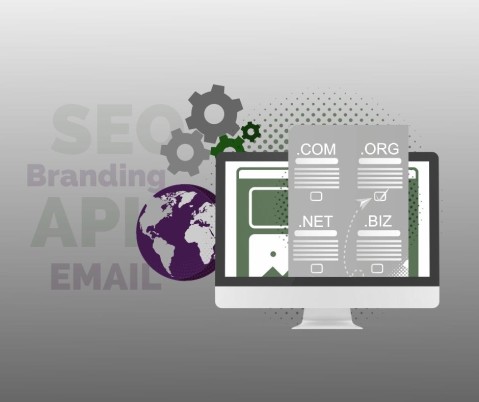Should I Change My Website Domain?
As the business landscape changes and affects things like the supply chain, consumer interest, and technology, you may find that your business has new offerings or services that no longer match the branding your company started with. When that happens strongly enough, it might become necessary to look to a rebranding or repositioning strategy to ensure your company's branding aligns with consumer expectations. In addition to tightening up company branding outside of cyberspace, aligning your business website to your new brand might be required as well. But how far can you go? We've put together a list of several things to consider before you change your website's domain.
Brand Recognition and Loyalty
If your business has been established for a long time, you've likely developed a many loyal customers who look to you first for specific products or services. People may be able to recognize your branding without a name attached to it – perhaps a specific color scheme or logo immediately reminds people of your company. The same can be said of your web domain. When looking at your website analytics report, consider how many people visit your website through the "direct" traffic source. Those individuals may be finding you by typing your URL into their browser, by clicking on a bookmark, looking at an old business card, or by some other means that does not rely on a search engine to bring you traffic.
For this reason, when changing a domain, it is vitally important to redirect all old site pages to the new domain. 301 "permanent" redirects can be set to send users directly to the correct page on the new domain, rather than just having them see a "page not found" error when looking for your services.
Search Engine Optimization
Your website's SEO is built to establish and maintain your reputation with users and search engines. When someone searches for a service you provide, your ranking in those search results reflects how valuable search engines think your website is to the user. Additionally, your website's metadata may still reflect the old branding. All these factors together can lead to danger for your site's rankings in search – any domain change will affect SEO, but by taking the appropriate steps you can mitigate some damage.
As such, it is vital that the domain doesn't just change, but that your SEO landscape changes as well. Metadata, sitemaps, and even your Google Search Console connection must be updated to reduce the hit to SEO that your website could take.
Website Dependencies
Depending on what type of website you're running, your domain can affect not only how people access individual pages, but other vital back-end services as well. Website dependencies include anything from the database that provides content to your users, to reCAPTCHA's and interactive maps you use to provide extra value to your users.
Database Dependencies
Some websites, especially those built on WordPress, hard code the website address you originally chose for your website. The biggest downside of this design choice is that if you ever decide to point a different domain at your WordPress site, the connection will fail because it doesn't match the original address. Migration of a WordPress site to a new domain is possible but will require extensive back-end database work to ensure everything runs smoothly.
API Connections
Some components on your website may be dependent on API connections. These are connections between a website component and a service on another website, allowing your website to access and utilize the services of another site. Two examples of these connections include Google's reCAPTCHA and embeddable Google Maps. Before migrating your website domain, make sure your API keys include permissions for your new domain to make use of them, or else services on your website could break.
Security Filtering and Server Configuration
If your website is hosted on a shared server, it is important to keep the old domain "parked" on top of your website's new domain. Otherwise, when a user types in your old domain and their computer is directed to your website server, the server may be confused and pull up the wrong webpage, confusing your customers. Because Google will keep previously indexed sites up on listings until it detects that the website isn't there anymore, that could mean a lot of search engine traffic might never make it to your correct domain without those precautions in place.
Additionally, some websites use a process called "request filtering" which will block connections to your server that do not specifically reference the correct website address. Neglecting to update the request filtering of your website address when changing to a new address can result in your customers being blocked when attempting to visit your website.
If your website uses forms, ecommerce, or other forms of automated interaction between the site and its users, there's a good chance it also sends out "transactional emails," emails that are designed to confirm some action has been taken, such as a purchase or a form fill. Your site's ability to effectively send emails is directly attached to certain DNS records on your domain. Failure to update these records can result in emails being flagged as spam or junk, or even in your domain being blacklisted by email services.
Additionally, if you use your website domain as your business email domain, you will need to have a mail migration plan in place to begin sending/receiving emails at your new email address without losing correspondence that took place while you used your old email address.
Is It a Bad Idea to Change My Domain?
While there are many considerations to make regarding whether it is the right time to change your domain, doing so can be beneficial to your brand too. Whether your company has changed hands, is looking to cater to a new audience, or has changed it services, changing your website branding can be a great way to get fresh eyes on your products and services.
Like many things in life, making a business choice like this should be taken on balance, and if the benefits outweigh the difficulties, then it may be time to change your domain.
Submit a Support Ticket
If you utilize the Technical Resource Solutions Ticketing Portal to manage and create tickets, click the button below to open a new support ticket.
Ticketing PortalIf you do not currently have access to the ticketing portal, give us a call to request access.
Call TechnicalRS





